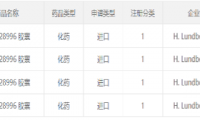-
$1.8 billion! Lilly builds factory and expands GLP-1 production
- Source: drugdu
- 74
- September 16, 2024
-
Increasing Investment in R&D Innovation to Deepen Product Competitive Moats
- Source: drugdu
- 74
- September 14, 2024
-
Tonghua Jinma Oral Drug Succinium Octahydroaminoacridine Tablets Listing Application Accepted
- Source: drugdu
- 67
- September 1, 2024
-
Luye Pharma’s Dual TAAR1/5-HT2CR Agonist LY03020 Approved for Clinical Trials in China
- Source: drugdu
- 76
- August 8, 2024
-
Cutting-Edge AI Analyzes Blood Samples to Predict Disease 10 Years Before Diagnosis
- Source: drugdu
- 64
- August 3, 2024
-
FDA Approves Alpha Cognition’s Zunveyl as Oral Therapy for Mild-to-Moderate Alzheimer Disease
- Source: drugdu
- 92
- July 31, 2024
-
FDA Approves Lilly’s Kisunla for the Treatment of Early Symptomatic Alzheimer’s Disease
- Source: drugdu
- 96
- July 4, 2024
-
New study reveals neurological conditions as leading cause of ill health worldwide
- Source: drugdu
- 125
- March 22, 2024
-
Lundbeck Pharmaceuticals’ “Anti-Parkinson’s Category 1 Chemical Drug” Submits Clinical Application in China
- Source: drugdu
- 156
- March 7, 2024
-
New Alzheimer’s Detecting Blood Tests Perform across Broad Range of Races and Ethnicities
- Source: drugdu
- 122
- March 2, 2024
your submission has already been received.
OK
Subscribe
Please enter a valid Email address!
Submit
The most relevant industry news & insight will be sent to you every two weeks.













